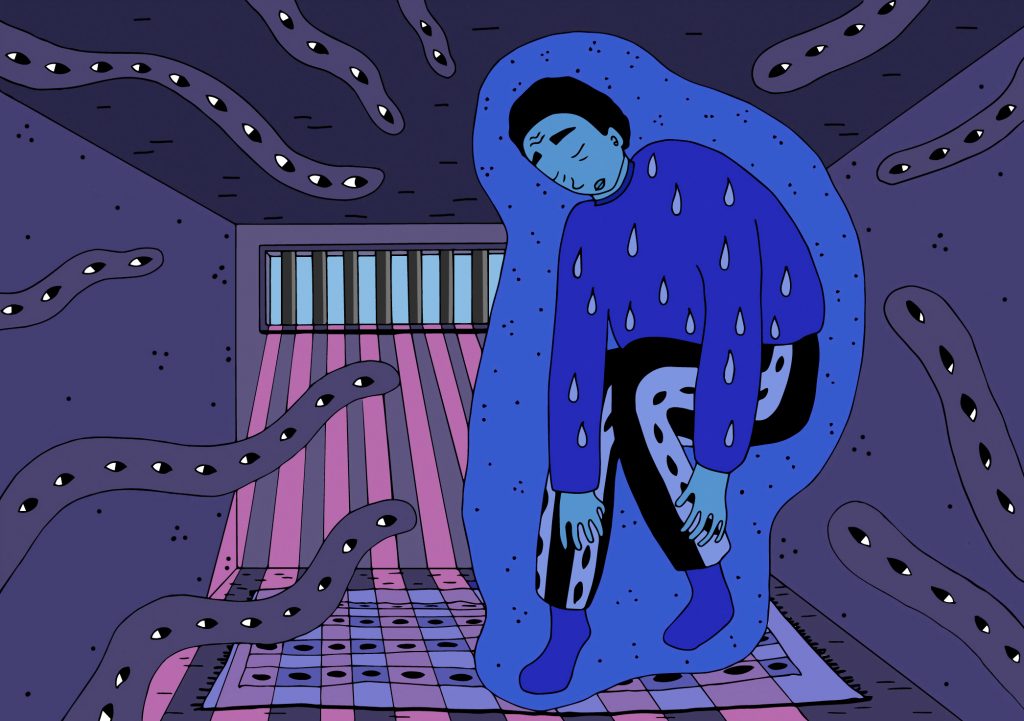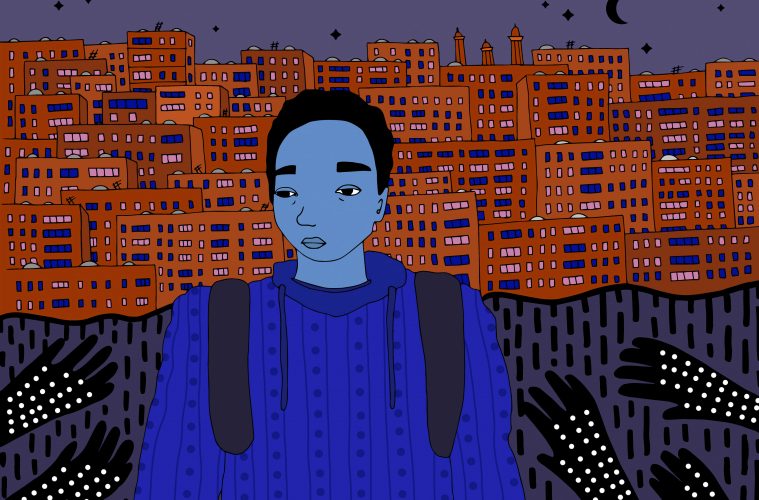Words by: Hiba Abu Taha
Translated by Nawara Ali
Illustrations by: Aude Nasr
This article is part of the “Emigration & Desolation” issue
Trigger Warning: This article contains triggering and sensitive material related to domestic abuse and torture, sexual trauma assault, self-harm and suicide.
“I’m not asking my family or society for anything. I just want to live without worrying about having a noose on my neck. I want to live without feeling like I should commit suicide because I freed my body from them, and because my heart longed for a female rather than a male.” This is how Shaima, the twenty-three-year-old Jordanian girl, began her story.
Estrangement surrounded her at home. She elaborated with sad eyes, “I dealt with my body in the way I deemed appropriate. I did not abuse anyone and like most humans on this earth, I fell in love and my heart was beating for a woman; why should I be held accountable for my feelings and sexual orientation, and persecuted because I am practicing my right?”
My childhood was a horror series
Shaima went back in time to a childhood tainted with terror, anxiety, and violence. She was born into a strict religious family and didn’t see her father until she was five, as he was abroad. Like any child, she longed to see him, but ended up regretting this once he came back. Her first memory of him is still stuck in her mind: Shaima’s brother told on her for reaching for a bowl of nuts while guests were at the house, and her father cursed at her, grabbed her neck, and hit her head against the wall. This wasn’t the only instance of abuse; she was often beaten by her father who would throw carefully-selected objects at her during fits of anger. Her body’s bruises and scars were evidence of her father’s tyranny and cruelty, as was her short hair which she cut so he wouldn’t pull it.
Shaima did not like her family’s house, and considered it a prison in which she was detained for life. It was big and full of rooms, and it was in the mosque, where her father was the imam. The house had its rules, including one that prohibited Shaima and her sisters from wearing short or tight clothes even when sleeping, or else they would be seen as infidels who would go to hell. Violence ruled over the situation; it was normal for Shaima to be physically abused, for her to be silent when beaten, and for her to be asked “what happened?” at school. She would just answer that she’d fallen, fearing tarnishing the image of her father. He was a clergyman compassionate with the world and monstrous with his family, who would invoke claims of “good childrearing” to justify beating Shaima. Her brothers also hit her, thinking it was their right since they were men.
Like Shaima and her sisters, their father also beat their mother. Provoked when she saw this, Shaima would run without further thinking to save her mom only to face the usual outcome — her father hit her for defending her mother, and her mother hit her for angering God by not letting her father do what he wanted to do.
“You’re ugly”
Shaima’s family didn’t only stick to the physical violation, but it also extended to verbal assaults and poisonous words. Her mother would attempt to break Shaima’s spirit and lower her self esteem, saying “this isn’t my offspring, she’s ugly,” and that Shaima “has no morals or looks.”
Despite all of the above, Shaima’s childhood dream was a hug from her mother or father. She only remembers this dream being fulfilled four times. As for her father’s embrace, it remained a dream for her, and might as well be forgotten.
I arrived at the airport and they seized my passport. They took me to a detention room where I spent twelve hours, and drove me in a security vehicle to family protection offices where I was forced to wear the hijab to meet my parents.
The rapist is innocent
Shaima faced the first incident of sexual harassment when she was seven years old; her brother placed her in his lap and touched her private areas. Then her grandmother grabbed him, cursed, and slapped him and so he didn’t repeat that crime again. As soon as Shaima started to feel safe again, another brother began harassing her when she would bring her mother’s things from the dark storage room. Not only was she told that she was lying when she tried to inform her mother but she also was forced to sit with him, resulting in ongoing molestation.
One night after the grandmother’s passing, her family was outside Amman visiting the governorate of Irbid. Her brother came home with morphine, forced Shaima to take it, and then raped her. She informed her family, but their main concern was reconstructing her hymen to “cover the shame” if she lost her virginity. They took her to the women’s clinic, and when it turned out she was still a virgin, they accused her of lying about her brother raping her. Here, Shaima stated that her hymen would only break at childbirth, but the crime went on without the criminal being punished.
First escape, first love
Shaima said, “No man caught my eyes and I never fancied the opposite sex. The first person to notice this was my university instructor; he advised me to download a dating app and I did. Shortly after, I met a girl in America named Sara, and we talked and grew attached to each other. We talked online for a few months, and then I escaped Jordan to America where she was.
“Then something unexpected happened: my friend whom I trusted stabbed me in the back and informed my family about everything. I’m certain it was for a price. My father threatened me to kill Sara’s children and I was so scared for her that I went to the airport without thinking just to protect her and her kids from my father’s viciousness. And so I booked the first plane back to Jordan.”
Back to hell
I went back to hell. I wouldn’t have imagined it to have turned into such a terrible hell until I arrived at the airport last March (2019) and they seized my passport. They took me to a detention room where I spent twelve hours, and drove me in a security vehicle to family protection offices where I was forced to wear the hijab to meet my parents. And that four hours after being interrogated by the investigator who shouted and hit the table every time I refused to answer a question that interfered with my life. In these moments, I almost screamed at the world that I am the victim, and that I can’t be the one at fault. How am I supposed to prove that I am a victim?
I met my parents and looked at them in disapproval, my mind not comprehending how I returned in hell again.
In these moments, I almost screamed at the world that I am the victim, and that I can’t be the one at fault. How am I supposed to prove that I am a victim?

Psychiatric Hospital as punishment
Shaima continued, “As soon as I entered the psychiatrist’s, he asked me, ‘Did you try to commit suicide?’ I strongly denied this and asked him for evidence to his accusations yet he remained insistent. I was moved to the psychiatric hospital so they would ‘protect me’ as my family refused to receive me. I arrived at the hospital and they stripped me to make sure I have no sharp tools, checking every inch of my body. It was humiliating.
“After that, they threw me in a room with mental patients who would wake up at midnight and hit me, and then would be taken to isolation by nurses who gave me sedatives and sleeping pills and tied my hands and feet to the bed. They treated us like we were beasts. Other than that, we were forced to tell our stories to the trainees and nurses when they got bored of work.
“I talked to the therapist or investigator – I don’t know her job title – who works with family protection and told her, ‘I’m a rational adult and it’s my right to travel to any country.’ At the end of the session, she told me that she could offer me protection, but that it would sadly be either in prison or the psychiatric hospital. After that, my family agreed to receive me, so I was released from this prison to move to my family’s prison.”
Rape in the name of marriage
Shaima reported, “I spent five months at home without a phone or a computer. The goal was rehabilitating me religiously to become a righteous and obedient wife. I moved into the marital house against my will, with a husband (my cousin) who I never accepted. He raped me several times when I refused to have sex with him until I bled, and not even that was enough to stop him. He would say, ‘you’re cursed when you deny me sex,’ and beat me. Other than considering me his property, he would lock all the doors and take the keys with him when going out unless a family member was going to visit me.”
Survival and the final escape
“One day my husband went to work and left the key in my possession, thinking that my family would come to visit me. This was my chance to either survive or spend the rest of my life in this marital prison, so I packed my things and escaped home to the airport. I booked the earliest flight to the United States and at a stopover, I was told that I can’t go to America because my visa expired. I begged them not to force me to return to Jordan because my life was in danger, and so they sent me to ___ , where I currently reside. And to this day, my family is looking for me to kill me so they would ‘wash the shame’ according to their imagination.”
To Jordan and the world
Shaima concluded with a message she addressed to Jordan and then to the world, “First, I say this to Jordan, which is no longer my home: Being away doesn’t hurt me, because Jordan didn’t protect me, it destroyed and tortured me because I am a woman and a lesbian. And to the police who are supposedly the ‘safety guards’, the psychiatric hospital. Finally, to my family whose weapons are pointed towards me, let alone the Jordanian authorities that refuse to renew my passport which will expire early next year. And to the world I say, don’t reject me just because I have beliefs and ideas that differ from yours. Don’t give yourself the right to kill whoever is different from you. Let us live humanely with respect for ourselves and others…”

